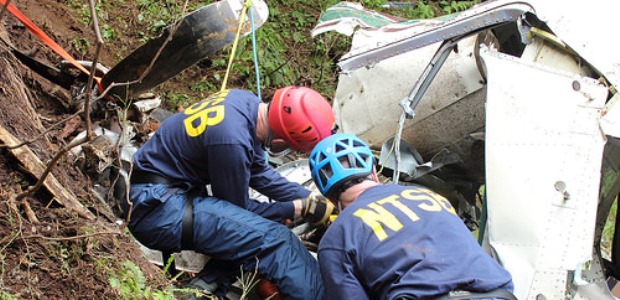
NTSB Cites Company Culture in 2015 Crash of Alaska Sightseeing Plane
"Pilot decisions are informed, for better or worse, by their company's culture. This company allowed competitive pressure to overwhelm the common-sense needs of passenger safety in its operations. That's the climate in which the accident pilot worked," said NTSB Acting Chairman Robert Sumwalt, who was a pilot for 32 years, flying for both Piedmont Airlines and US Airways.
The National Transportation Safety Board concluded that the pilot's decision to continue flying under visual flight rules in weather conditions warranting instrument flight rules, along with the Alaskan air tour company's culture and lack of a formal safety program, caused a 2015 crash near Ketchikan, Alaska. Nine people died when the de Havilland DHC-3 (Otter) airplane operated by Promech Air, Inc., of Ketchikan crashed into mountainous terrain on June 25, 2015.
(The photo illustrating this story was taken June, 30, 2015, and shows NTSB Investigators Brice Banning and Clint Crookshanks examining wreckage from the aircraft. It is an NTSB photo by Ketchikan Volunteer Rescue Squad – Jerry Kiffer.)
The NTSB's report says the pilot had less than two months' experience flying air tours in southeast Alaska and had demonstrated difficulty calibrating his own risk tolerance for conducting tour flights in marginal weather or weather below FAA minimums. Evidence collected during the investigation showed the pilot's decisions regarding his tour flights were influenced by schedule pressure, by trying to match the behavior of more experienced pilots, and by Promech's culture, "which tacitly endorsed flying in hazardous weather conditions," according to NTSB.
"Lives depended on the pilot's decision-making," said NTSB Acting Chairman Robert Sumwalt, who was a pilot for 32 years, flying for both Piedmont Airlines and US Airways. "Pilot decisions are informed, for better or worse, by their company's culture," he added. "This company allowed competitive pressure to overwhelm the common-sense needs of passenger safety in its operations. That's the climate in which the accident pilot worked."
The board determined Promech failed to manage the risk associated with competitive pressures. The Ketchikan air tour industry is competitive, and Promech and at least one other operator that was willing to take more weather-related risks were both able to fly more revenue passengers than two competing operators that cancelled flights that day, according to NTSB's report, which includes nine recommendations to the Federal Aviation Administration and one to the Cruise Lines International Association, as well as three repeated recommendations to FAA.
The full report will be available within a few weeks at https://www.ntsb.gov.